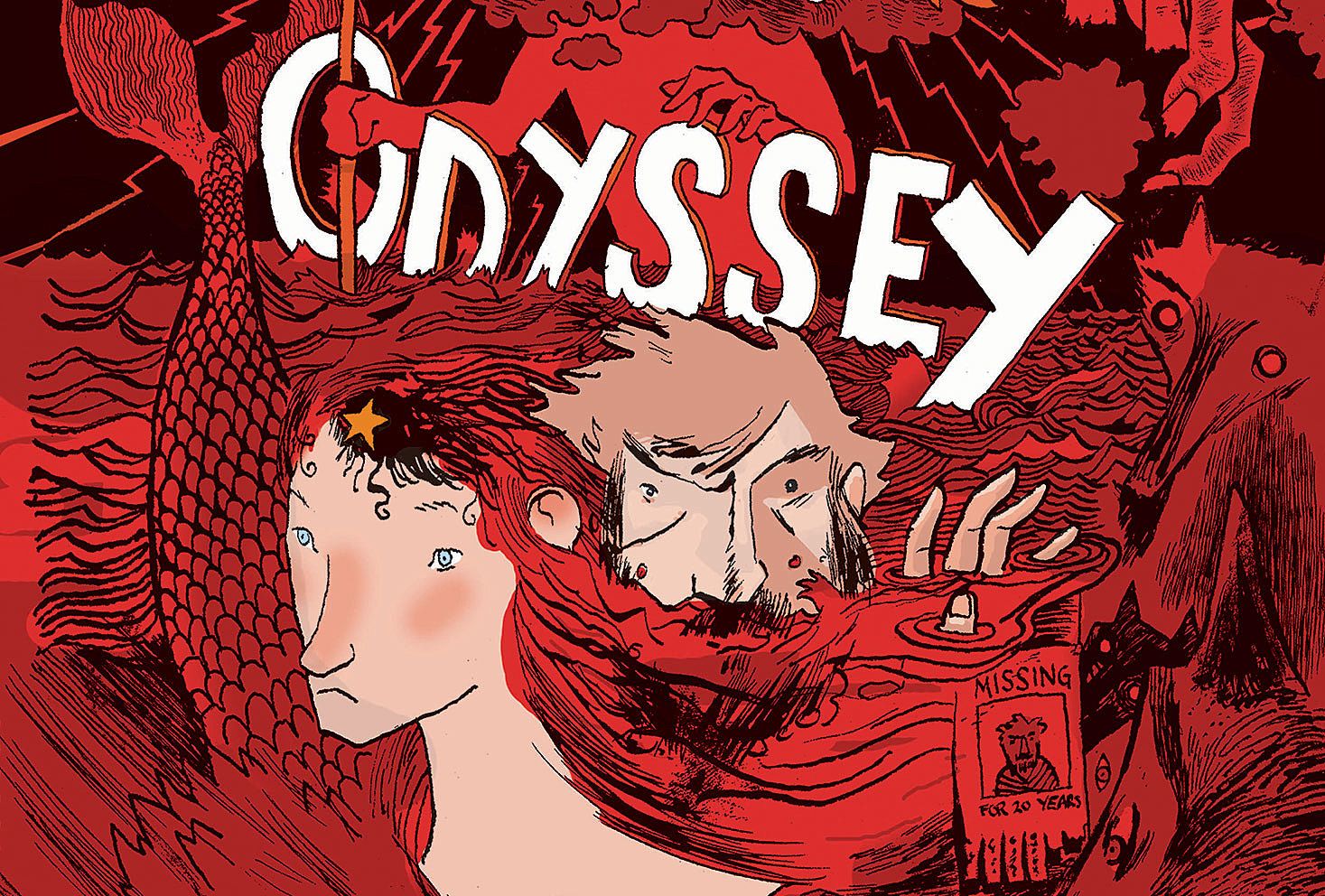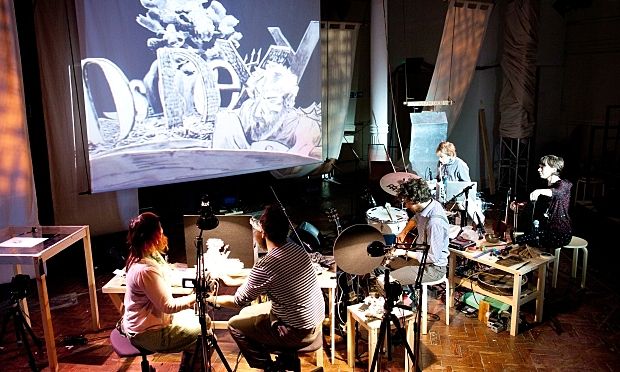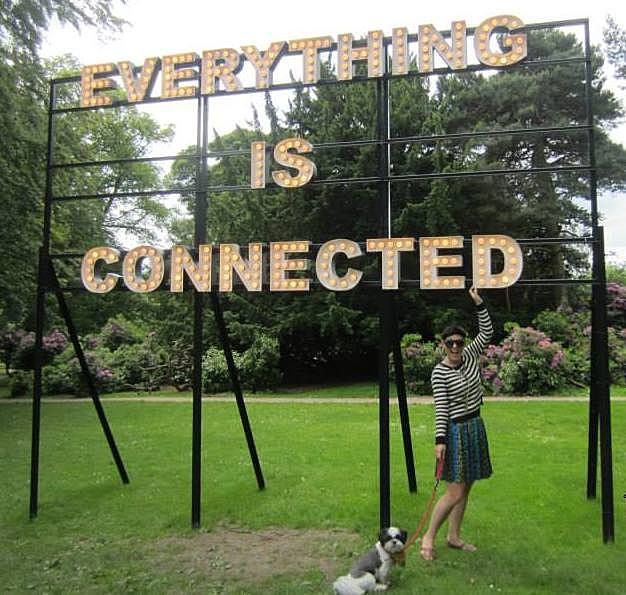Common Threads and Loose Notes: Paper Cinema's The Odyssey
Rebekah Guy talks to UK musician Quinta about Paper Cinema's current show, The Odyssey - a mix of puppetry, live music and foley.
When I was 12, I beheld one of the greatest sights of my life. We were studying Homer’s Odyssey at school and our teacher thought it’d be ‘really cool’ to invite a Greek epic poem specialist to our class to perform the story for us. If, like for my 12-year-old self, this seems impossible to conceive, let me describe:
Our Greek epic poem specialist was a middle-aged man – slight of stature, long of hair, straggly of beard and ill-fitting of pant – who stalked into our class looking surly and making so much eye-contact. So much. Without saying a word, he communicated to the room a tense challenge: “Dare to mock my craft, you children, and reap the pain of a thousand asp bites!” He stopped when he reached the front of the room and whirled towards us. Still silent, he leaned down to his rucksack, took out a bottle of red wine, and poured it into a pewter goblet. The goblet was held aloft as he bawled something in Latin towards the sky. Then, once again locking eyes with each of us as he did it, he tipped the goblet of probably-cask-quality Shiraz all over the synthetic-carpet-tiled floor. My entire class was stunned. Scandalised. (We found out later that it was an offering to the gods and appropriate to the cultural traditions of reciting Greek epic poetry. Of course.)
Following this ceremony, he proceeded to recite the entirety of the poem to us with no notes and nary a line flub. When he was finished he stalked right back out again without a single word. At no point did he even say hello to my teacher. I doubt he signed in as a visitor with the receptionist.
This man remains the greatest person I never met; he created one of my most intense school memories and made The Odyssey one of my favourite things in the world. It’ll be him in my head narrating the story when I go to see the UK’s Paper Cinema do their version.
Quinta, one of Paper Cinema’s multi-instrumentalists, has a similar, quirky-male-based affinity with the text. Her dad was a classics teacher - he’s the one who gave her that distinctive nickname, the Latin word for ‘the fifth, who is a girl’ (pronounced KWINTA) - and although not quite on the same level as my Greek epic poem specialist, Quinta’s dad told her Homer’s stories at a young age. “I feel like it was inevitable that I’d find my way to Paper Cinema and this show.”
It’s not surprising that Quinta’s path to being a composer and performer with Paper Cinema has been peppered with various other projects. She’s been involved with session and live music for UK greats including Bat For Lashes, Radiohead’s Phil Selway, Penguin Café, and Patrick Wolf. She’s a member of Collectress, a group of experimental multi-instrumentalists who improvise film scores and stand-alone narratives with intriguingly Gothic chamber music sensibilities. And if that sounds like too many syllables for a description of one lone life, consider that, in additional syllable news, Quinta was a long-time collaborator with Music in Prisons, then co-founded Music in Detention. Both are UK-based organisations who pair musicians with people in need of expressive outlets; the former with inmates, the latter with immigration detainees.
I sense Quinta is someone who, when faced with a chance to do something new - whether it be work, fun or relationship-based - grabs on to it hard and fast. It’s the type of person I’m currently striving to be, and so I bring the conversation around to asking her how to do it, in not so many words. She’s understandably hesitant about giving a girl from another country advice about how to live her life. “It depends on what opportunities you seek out and then which ones come your way as a result of seeking out those things. You can get on to a bit of a path,” she hedges.
I ask her if it’s worth it. On this subject she’s more forthcoming. “Yes, YES. I really believe it is. It makes you realise that there’s such a common thread to things, I mean we’re almost all trying to deal with the same sets of feelings, or trying to communicate in similar sorts of ways. It seems really simplistic somehow but there is this sensibility which runs across all different disciplines. It’s something that’s part of a lot of groups that I’m in, where everyone’s quite multidisciplinary, and that’s what makes the things we make really rich. We all appreciate each other for that.”
We’re almost all trying to deal with the same sets of feelings, or trying to communicate in similar sorts of ways. It seems really simplistic somehow but there is this sensibility which runs across all different disciplines.
For Quinta, her work seems driven by a deep understanding of the power of music and how it connects people. I tell her I’m keen to hear about her experiences in prisons, having recently visited Mt Eden Corrections Facility for the first time as part of a theatre company touring a play about violent offenders.“The bravado of those we worked with in prisons, you know, the need for someone to be ‘the daddy’, contrasted so starkly with the people in the detention centres,” Quinta says.
We experienced a glimpse of this over here. Even though I visited a so-called ‘good behaviour’ unit and the prisoners were friendly and happy to engage with what we did, some of them emanated what felt like combative energy. At the time I assumed I was sensing my own projected insecurity, but having talked to people with more experience in that context I learned that this thinly veiled dominance over visitors is what keeps inmates feeling safe in their own territory.
Having said that, there were also surprising, warm, intimate moments: at one point, an inmate came up to me and said he liked the shoes I was wearing because they had dogs on them, before proceeding to tell me about his own dogs. The reduction of humanity inside that prison unit was so palpable that when the dog conversation happened I felt like I’d made an instant best friend.
I tell Quinta that after my couple of hours inside Mt Eden prison, I felt a strange sense of privilege. It wasn’t related to anything as obvious as my freedom versus the inmates’ imprisonment; instead it had to do with the fact that I felt lucky to have met them, seen where they lived, learned their names, listened to what their voices sounded like when they had conversations with each other or talked about themselves. I’d had an opportunity to see, hear, smell and touch a part of the community that a majority of people will never experience. If society is a system, the bit which (ostensibly) changes people from bad to good is a fairly important part of it, yet no one else I know will probably ever understand it from the inside because it’s not like Sirco sells Jail Tickets. It’s a prohibitive process to get inside a prison. but if anyone could do what I was able to do, would their views change
It’s a sentiment I’m not confident I’ve expressed successfully to Quinta (and in fact it looks oddly insufficient now, typed on a page), but she agrees that the ties that bind are often strangely formed, telling me of one woman she encountered at Holloway Women’s Prison in London. “This woman started the series of [Music in Prisons] song-writing workshops with us looking a bit down on herself, you know, with her hair scraped back off her face in a ponytail.”
By the end of the week she’d washed her hair, and cascades of beautiful red tresses hung over her shoulders. “She’d literally let her hair down. I know that’s kind of a bit obvious but it felt like that. It felt like people really opened out. It was amazing what people came out with, and amazing to find out what people’s talents are. I feel sometimes people are reduced to a set of basic needs, you know, that triangle of shelter and food and whatever, but I just think, ‘What about the things we want to express?’ I really believe that if you let people express their talents they can rise above these basic things, whatever their horrible circumstances. I’ve seen it.”
Collaboration is Quinta’s watch-word, and it’s a definite theme that permeates everything she does creatively. Paper Cinema’s Odyssey is the most recent outlet for that: three musicians take one side of the stage while two puppeteers manipulating intricate, hand drawn paper cut-out ‘puppets’ take the other, and a cinema-sized screen showing streamed footage of the puppets hangs in the middle. The musicians provide the soundscape, which includes the violin and musical saw (Quinta’s specialities), guitar, and keyboards. Really though, electronically speaking, for any given performance the possibilities for sound are endless.
“We have a lot of other sounds that we can manipulate. Chris [the guitar player] also plays drums, and there’s various bits of percussion, and tons of foley stuff. So we’re actually making sound effects as well, from a table full of all sorts of rubbish. Crisp packets, bubble wrap, a knife and fork, different bits of fruit. Just a whole lot of stuff we can make noises with.”
Anyone who saw Live Live Cinema’s Carnival of Souls or Dementia 13 will understand the thrill of seeing a performance created live in this way, where the construction of a work is turned inside-out: with the process on display as much as the product is. The interplay between each member of the cast and the tension for the audience of watching the delicate workings of so many cogs in an intricately-crafted machine is where these performances hit their stride.
“What you get when you see a band play live is actually the chemistry of those people performing in that moment, and hopefully that’s something that’s engaging about The Odyssey. They can watch us making it, and see everything that goes into it. Sometimes people will come to the same show a number of times because there’s so much to watch that if your eye gets caught by something you might miss something else. They can come back again and see it in a new way.”
But how do the narrative elements work? “It’s pretty much word-free,” says Quinta. “Telling a story through pictures and music has been Paper Cinema’s format right from the start. They’re really good at it. And it really helps the show travel. It’s been through China, Georgia, Brazil, Indonesia, France, Germany…”
I’m interested to hear how someone in China would relate to the story. “Well, it doesn’t seem to matter where you’re from in the world - someone snorting like a pig into the microphone makes everybody laugh.”
The strange but undeniable universality of Homer’s epic poem speaks directly to the heart of Quinta’s work and also, too, to the idea of connection. It’s the feeling of wanting to cherish seemingly insurmountable differences in background, values, religion, age, gender and ethnicity, because out of them can come the most arresting moments of perfect human harmony. It makes you want to follow those differences as far as they reach.
Paper Cinema’s Odyssey plays at the Lower NZI (Aotea Centre)
from Wednesday 29 October - Saturday 1 November | 7pm
Tickets available through Auckland Live



